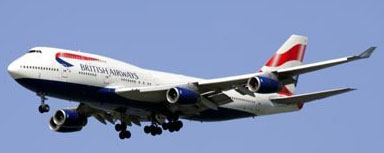Better than Bombs: Law enforcement comes to the rescue once again
Even if you’re not a news junkie, by now you’ve surely heard of the plans to blow up multiple flights from the UK to the US that were foiled by police.
It’s hard to imagine the people that plot these attacks. I sat in my backyard and tried to, listening to cars rushing by on Main Street and scattered bits of conversation that floated on the wind in this busy downtown.
Busy, but peaceful. This is the contrast between Canadian life and the lives of the people who seek to explode airliners full of children and parents, sleepy businesspeople and touring twenty-somethings. Their dangerous, secretive lives are like fiction to most of us, except for the people in law enforcement and intelligence services whose job it is to protect us.
 A British Airways 747 – not necessarily the type of plane targeted
A British Airways 747 – not necessarily the type of plane targeted
Clearly it’s law enforcement we have to thank for uncovering this plot and arresting those responsible (hopefully, all of them). Once again, thousands of innocents have been saved by police.
It’s often this way: police on Western soil trying to catch people who want to kill Westerners, and being mostly successful. In spite of this, it’s the military that always seems to be at the forefront of the “war on terror”.
But how many terror plots against the West has the American military foiled in Iraq? What are the chances that those arrested for the UK airliner plot are Iraqi, Lebanese, or Afghani?
Bush had this to say, which I believe he memorized in late September, 2001 and has been repeating ever since:
The recent arrests that our fellow citizens are now learning about are a stark reminder that this nation is at war with Islamic fascists who will use any means to destroy those of us who love freedom, to hurt our nation.
Clearly, Bush is talking about you and me. We both love freedom, right? The only people who hate freedom are “Islamic fascists”. (Which begs the question: why are we putting them in jail? If they hate freedom so much, surely they love captivity.)
We’re not like them, Bush says. Westerners love freedom and peace. But Western bombs keep raining down on the Middle East and South-West Asia. Is that really helping to protect us?
Perhaps we should focus on policing to keep us safe, instead of military invasions and occupations, while seeking to solve problems elsewhere in ways that don’t involve more killing.
[tags]Heathrow, London, security, police, politics, Canada[/tags]

 twitter.com/adriandz
twitter.com/adriandz
